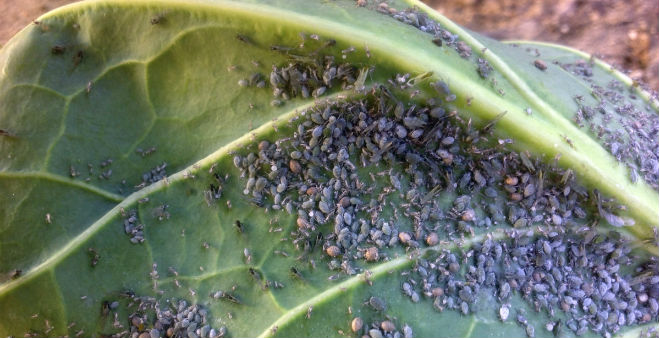Feb 23, 2017Organic pesticides help manage cabbage aphids on brussels sprouts
Severe infestations of cabbage aphids can virtually destroy a crop of Brussels sprouts, making them unmarketable. However, new research from the University of New Hampshire shows that organic pesticides can be effective in managing the pests.
The research was conducted by Becky Sideman, a researcher with the NH Agricultural Experiment Station and extension professor of sustainable horticulture production, and her undergraduate student Talia Levy. Levy studied the issue of aphid infestations of Brussels sprouts for her senior thesis. The research was conducted at the UNH Woodman Horticultural Research Farm, a facility of the NH Agricultural Experiment Station.
“In recent years, we performed experiments comparing different varieties of Brussels sprouts as well as different growing practices. In these experiments, we observed severe infestations of cabbage aphid. Although our research did not focus on the aphids, they were quite a nuisance and rendered most sprouts unmarketable. From conversations with growers in the region, we came to realize that many growers, especially organic growers, were struggling with cabbage aphid management,” Sideman said.
To address this issue, Levy compared two different methods of managing cabbage aphids: intercropping with flowers that provide habitat for naturally-occurring aphid predators, and using organic insecticides, alternating between insecticidal soap, and a combination of azadirachtin and pyrethrins.
“While we observed lots of aphid predators and parasites on the flowering plants, they did not provide sufficient control of cabbage aphids. On the other hand, weekly scouting and application of organic pesticides when economic thresholds were reached did provide good control of cabbage aphid,” Sideman and Levy said.
This material is based upon work that is supported by the National Institute of Food and Agriculture, U.S. Department of Agriculture, under award number 228522. For additional information on this research project, visit https://extension.unh.edu/resources/files/Resource006332_Rep9072.pdf.
— Lori Wright, University of New Hampshire
Source: New Hampshire Agricultural Experiment Station















